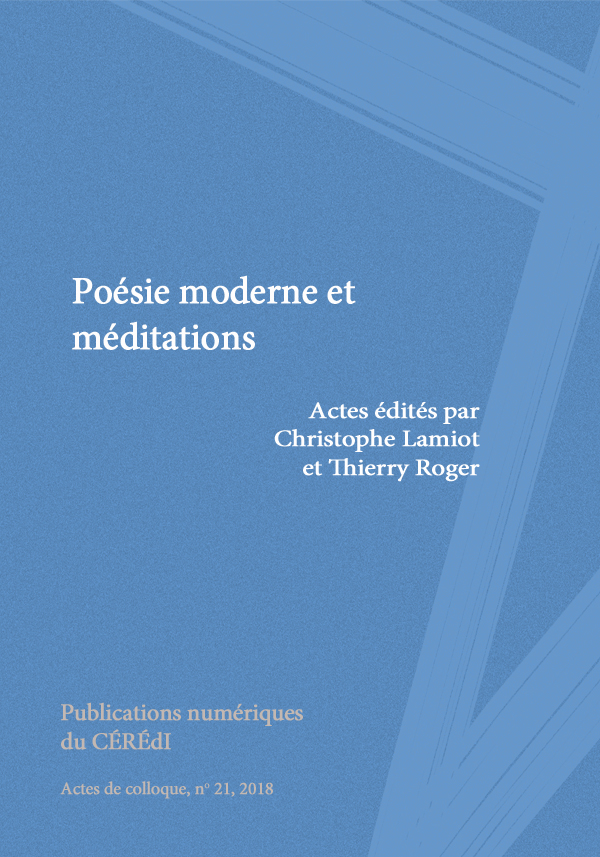Sommaire
Poésie moderne et méditations
Actes des journées d’étude organisées à l’Université de Rouen les 21 mars 2017 et 19 mars 2018, publiés par Christophe Lamiot (ÉRIAC) et Thierry Roger (CÉRÉdI)

- Christophe Lamiot Poésie moderne et méditations, journée d’étude
- Thierry Roger Poésies de la méditation : modes de discours, modes de vie
- Claude Ber À la diable et à l’emporte-pièce. Du poème comme pratique méditative
- Lee Ann Brown Meditation and Poetry
- Laynie Browne Thoughts on Meditation and Writing
- Norman Fischer Meditation and Poetry
- Carla Harryman Mirror Play and Meditation
- Amy Hollowell Poetry and meditation
- Armelle Leclercq Bric-à-brac
- Christophe Lamiot Enos À mes amies les tortues
- Joe Ross Poetry and Meditation
- Isabelle Alfandary Méditer avec Gertrude Stein
- Anne Gourio Yves Bonnefoy, le haïku et la méditation de la présence
- Jean-François Puff Jacques Roubaud et l’usage méditatif du poème
- Caroline Andriot-Saillant Méditations murmurées dans Son blanc du un de Dominique Fourcade
- Thierry Roger De l’usage du poème : lire, interpréter, méditer
Voix de poètes
Poetry and meditation
Amy Hollowell
1At the outset, I might posit for clarification that the word “meditation” implies a duality, suggesting a subject that meditates upon an object, while my own practice of so-called meditation involves an experience of non-duality, of just being here now. I thus prefer the noun “sitting” and the verb “to sit.” However, for the purposes of this text, I will conform to the conventions of the seminar and use the word meditation.
2Like the late American poet and Zen master Philip Whalen, I would say, “My writing is the manifestation of my mind moving.” Meditation is a practice / posture wherein I can experience directly the impermanent nature and interconnection of all beings and things because I am not interfering with how things are or with the endless, inexorable flow of the whole of life. It thus involves a “dwelling” in “non-dwelling,” seeking to not fix my attention on any one thing but rather to be attentive to it all. The poem is an attempt to express in words that experience of things-as-they-are-here-and-now. Meditation helps me cultivate the “negative capability” of Keats, the possibility of remaining in uncertainty, mystery, doubt, so as to better experience and express just what is, without grasping for reason, explanation, logic. Meditation and poetry both open the doors to the silence of the sacred and the unknown. Both are ways of living, arts of living, manifestations of the two faces of reality: meditation is non-dual, silent, without form, a “perfect” unity before words and language, where all is equal; poetry is dual, concrete, a written / spoken expression with an “imperfect” diversity of different words and language. Thus the challenge. Thus the beauty. And thus the celebration: “Ring the bells that still can ring / Forget your perfect offering,” the poet and Zen monk Leonard Cohen sings in his song “Anthem.” “There is a crack in everything / That’s how the light gets in.”
Here we are / Nous ici : extraits
3
Actes des journées d’étude organisées à l’Université de Rouen les 21 mars 2017 et 19 mars 2018, publiés par Christophe Lamiot (ÉRIAC) et Thierry Roger (CÉRÉdI)
© Publications numériques du CÉRÉdI, « Actes de colloques et journées d’étude », n° 21, 2018
URL : https://publis-shs.univ-rouen.fr/ceredi/469.html.
Quelques mots à propos de : Amy Hollowell
Amy Hollowell is a poet, translator, journalist and Zen Buddhist teacher. She has long been a figure in the Anglophone poetry scene in Paris and is the author of several poetry collections and chapbooks. A former editor at the International Herald Tribune, she teaches Zen meditation in Paris at the Wild Flower Zen Center (www.wildflowerzen.org), which she founded and directs, and elsewhere in Europe, primarily in Portugal. The mother of two children, she lives with her husband in Montreuil, a suburb of Paris.
